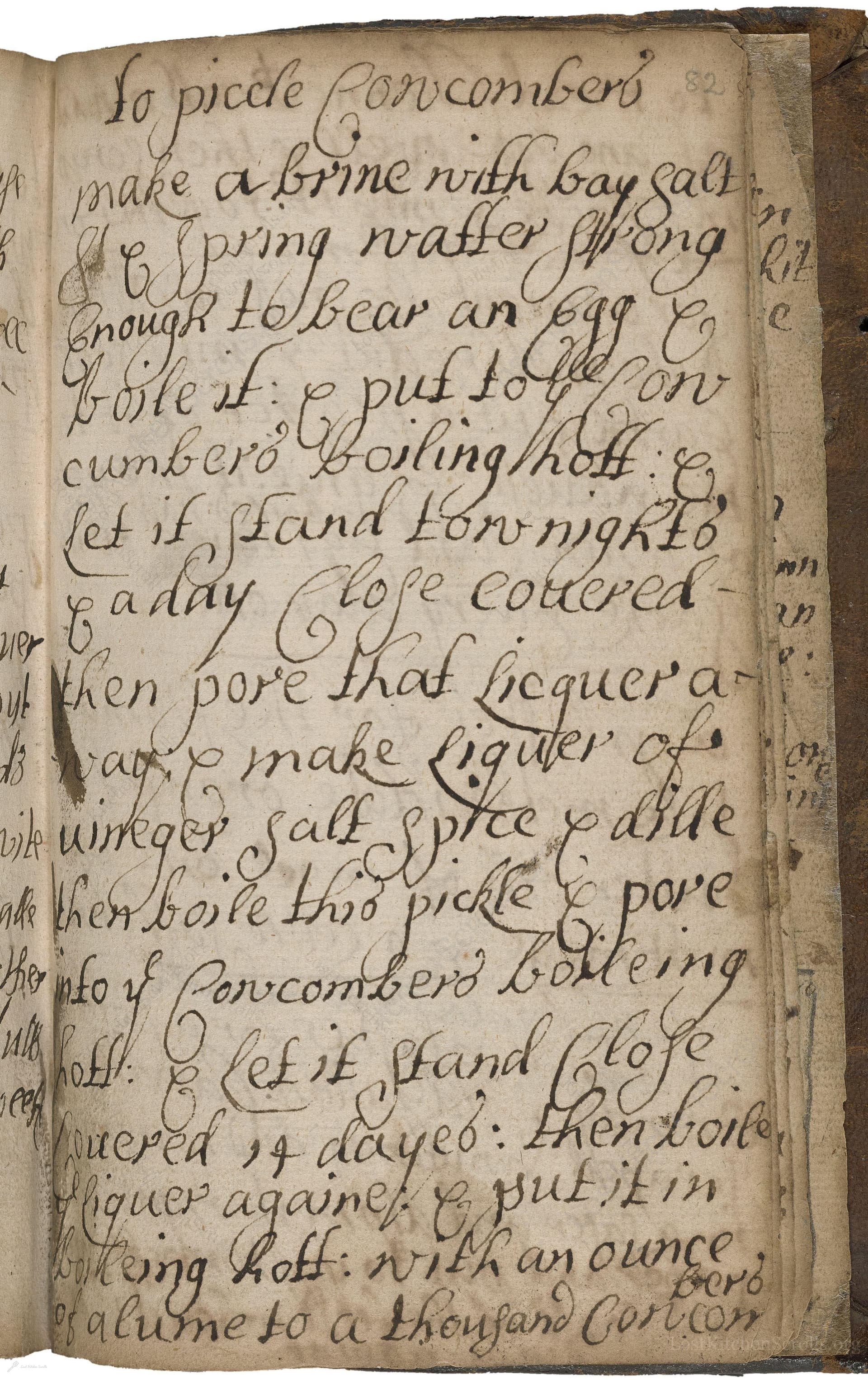To Pickle Concomberd
From the treasured pages of Medicinal and cookery recipes by Katherine Brown
Written by Katherine Brown

To Pickle Concomberd
"82 make a brine with bay salt & Spring watter Strong Enough to Bear an egg & Boile it: & put to ye Conv cumberd Boileing hott: & let it Stand for night & a day Close covered then pore That liquer a= way & make liquer of wineger Salt Spice & dille then boile this pickle & pore into ye Concomberd Boileing hott: & let it Stand Close covered 14 dayes: & then boile liquor againe & put it in Boileing hott: with an ounce of alume to a thousand Concomberd"
Note on the Original Text
Like many early modern English recipes, this one uses a narrative, non-standardized format. Quantities are often referenced in practical terms ('strong enough to bear an egg'), and instructions are more about order and method than detailed measurement. Spelling is phonetic and variable ('concomberd' for cucumber, 'wineger' for vinegar, 'liquer' for liquor), typical of manuscripts from this period before English spelling was standardized. Recipes assume a level of expertise in the kitchen, expecting the reader to interpret proportions and cooking times based on experience.

Title
Medicinal and cookery recipes by Katherine Brown (1656)
You can also click the book image above to peruse the original tome
Writer
Katherine Brown
Era
1656
Publisher
Unknown
Background
A charming 17th-century collection of culinary secrets and recipes, Katherine Brown’s handwritten compendium invites readers to savor the flavors and methods of England’s past, where each page serves up a delicious taste of history.
Kindly made available by
Folger Shakespeare Library
This 17th-century pickling recipe comes from Katherine Brown's manuscript, dated approximately between 1650 and 1662. Food preservation was vital in the early modern kitchen, especially before refrigeration. Pickling cucumbers with brine and vinegar was a common way to extend the shelf life of seasonal produce, ensuring a supply of vegetables through the winter months. The recipe also reflects the growing English enthusiasm for imported and novel vegetables ('concomberd' being cucumber), along with preserved flavors like dill and vinegar, which were becoming firm favorites among households with the means to indulge in such kitchen arts.

In the 1650s, cooks would have used a large earthenware pot or stoneware crock to brine and pickle the cucumbers, along with a wooden or pewter ladle for pouring hot liquids. They'd boil liquids in heavy cauldrons or iron pots, often using an open hearth or simple stove. A weight or wooden board would be used to keep the cucumbers submerged, and linen cloths or wooden lids to cover the vessel closely.
Prep Time
15 mins
Cook Time
15 mins
Servings
10
We've done our best to adapt this historical recipe for modern kitchens, but some details may still need refinement. We warmly welcome feedback from fellow cooks and culinary historians — your insights support the entire community!
Ingredients
- 2.2 lbs cucumbers
- 3.5 oz bay salt (substitute: coarse sea salt)
- 1 quart fresh spring water
- 3 1/8 cups white wine vinegar
- 1 cup water
- 0.7 oz salt
- 1/3 oz fresh dill
- 1 tbsp whole pickling spices (mustard seed, coriander seed, peppercorns, cloves)
- 0.04 oz (about 1/4 tsp) food-grade alum (optional, for crispness)
Instructions
- To make these historical pickled cucumbers, start by preparing a salt brine: dissolve about 3.5 ounces of bay (or sea) salt per quart of fresh spring water.
- Make it salty enough that a fresh egg floats just above the surface.
- Bring the brine to a boil, then pour the boiling liquid over your fresh cucumbers (about 2.2 pounds), making sure they are fully covered.
- Cover tightly and let sit at room temperature for 24 hours.
- After that, drain away the brine.
- Next, bring to a boil a new pickling liquor: for every quart, use 3 1/8 cups white wine vinegar, 1 cup water, 0.7 ounces salt, 1 tablespoon whole pickling spices (such as a mix of peppercorns, mustard seed, coriander seed, and cloves), and a generous handful (about 1/3 ounce) of fresh dill.
- Pour this boiling hot over the cucumbers, cover, and leave for 14 days at cool room temperature.
- For extra preservation (and as the text suggests), after 14 days, boil the pickling liquor again and pour over the cucumbers, this time adding 0.04 ounces (about 1/4 teaspoon) of powdered alum per about 2.2 pounds of cucumbers, if desired for crispness.
- Let cool, seal, and store in sterilized jars.
Estimated Calories
12 per serving
Cooking Estimates
You will spend around 30 minutes preparing the cucumbers and boiling the brines. There is no active cooking time except for boiling and pouring, which takes just a few minutes. Waiting for the pickles to ferment and soak takes over two weeks, but you don't need to do anything during that time. Each serving is about 100 grams and contains roughly 12 calories, since most of the calories come from the cucumbers themselves.
As noted above, we have made our best effort to translate and adapt this historical recipe for modern kitchens, taking into account ingredients nowadays, cooking techniques, measurements, and so on. However, historical recipes often contain assumptions that require interpretation.
We'd love for anyone to help improve these adaptations. Community contributions are highly welcome. If you have suggestions, corrections, or cooking tips based on your experience with this recipe, please share them below.
Join the Discussion
Rate This Recipe
Dietary Preference
Main Ingredients
Culinary Technique
Occasions

Den Bockfisch In Einer Fleisch Suppen Zu Kochen
This recipe hails from a German manuscript cookbook compiled in 1696, a time whe...

Die Grieß Nudlen Zumachen
This recipe comes from a rather mysterious manuscript cookbook, penned anonymous...

Ein Boudain
This recipe comes from an anonymous German-language manuscript cookbook from 169...

Ein Gesaltzen Citroni
This recipe, dating from 1696, comes from an extensive anonymous German cookbook...
Browse our complete collection of time-honored recipes



